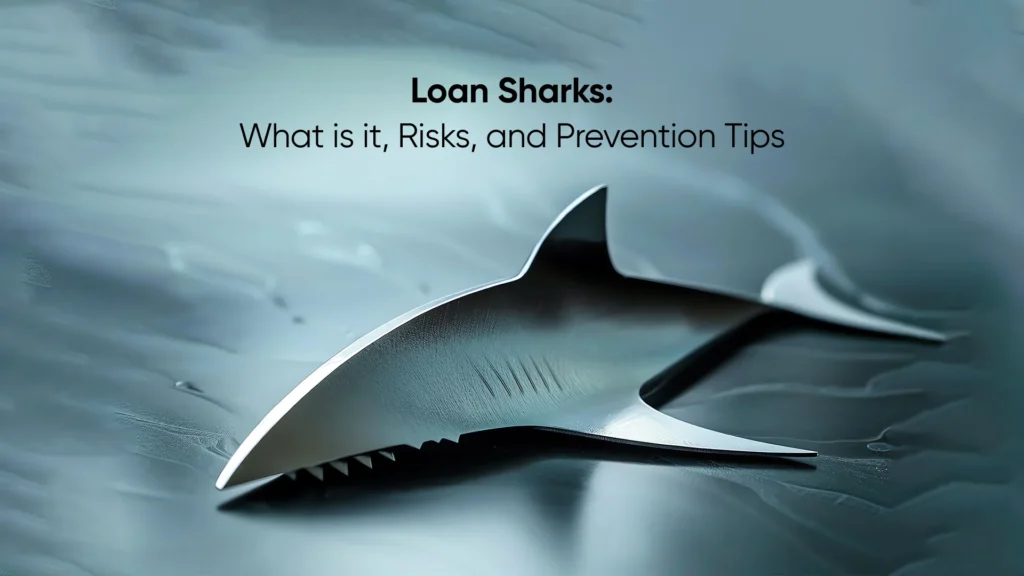Loan Sharks: What is it, Risks, and Prevention Tips

Table of Contents
ToggleWhat is a Loan Shark?
Imagine you’re in a tough financial situation with an emergency crisis going on. The unforeseen bills keep piling up, and you’re in desperate need of money. During such situation, stress and pressure can sometimes drive people to make bad decisions. This is how people end themselves dealing with a loan shark.
So, What is a loan shark? A loan shark is an unlicensed lender who offers quick cash without any paperwork or rules. At first, it may seem like a lifesaver if you need money fast, but it can quickly turn into a dangerous debt trap. Loan sharks charge extremely high interest rates, which add up quickly and make it very hard to pay back the loan. Borrowers can get stuck in a cycle of debt, unable to repay what they owe. If this happens, loan sharks can become aggressive, using threats or even violence to get their money back. This puts borrowers in danger, both financially and personally.
Understanding Loan Sharks: Key Characteristics
Loan sharks are notorious for their aggressive behaviour and charging extremely high interest rates. Their typical traits include:
- High-Interest Rates: They will charge you more interest rates than the legal limit. This makes it impossible for debtors to repay the loan amount on time, ultimately leading to even deeper debt.
- Unlicensed Operations: They operate without any regulatory oversight, making them difficult to track and report.
- Threats and Intimidation: They frequently use violence and threats to get their money back, which puts the borrower in danger.
- Hidden Fees: They keep adding hidden charges which were not mentioned before, on top of outrageous interest rates.
How Loan Sharks Operate
Typically, loan sharks target people who are in desperate need of money, have a low credit score, or have restricted access to formal banking or financial institutions. This is how they usually operate:
- Quick Approval: Neither a system nor appropriate documentation is in place. They will provide you with quick cash. They are attractive to those in urgent need of money because they won’t bother to look up your credit history or check if you are eligible.
- Collateral Demands: Most of the time, they will ask you to pledge an asset so they can take it if you are unable to pay back the debt.
- Repeated Payments: It may be necessary for borrowers to make large, regular payments, the majority of which will cover interest rather than principal reduction.
Dangers of Borrowing from Loan Sharks
Taking a loan from a loan shark can lead to severe financial and personal consequences, including:
- Debt Trap: The borrower may end up repaying several times the actual loan amount as the loan sharks charge excessively higher interest rates.
- Loss of Assets: Because loan sharks want you to pledge assets, you could lose them if you don’t repay them.
- Physical and Psychological Harm: They are primarily destructive and use violence and threats to recover money. This could result in anxiety, tension, and bodily injury.
- Legal Problems: Engaging with unlicensed lenders can lead to complications with the law, even if the borrower is innocent of any wrongdoing.
How to Identify Loan Sharks
Spotting a loan shark can be hard but it is important to protect oneself. Here are signs to look for:
- No Paperwork: It is a major red flag for any lender to refuse to give you the written agreement or evidence of documentation.
- No License or Registration: Legitimate lenders have licenses and are subject to regulations. Usually, loan sharks don’t have a license.
- Pressure Tactics: If lenders use a method of threatening you or aggressive behaviour to collect money, they are most likely a loan shark.
- Excessive Interest rates and Charges: Other than outrageous interest rates, loan sharks will charge you with hidden or unclear fees that increase the cost of borrowing. This can be another sign.
Legal Alternatives to Loan Sharks
It’s crucial to conduct thorough research before falling victim to loan sharks. Be sure to research your alternatives and be well-informed before taking out any loans. Here are some legal alternatives:
- Trusted Banks: You can look for legitimate banks who offer personal loans with regulated interest rates. They usually require good credit score and are safe and transparent with the terms.
- Non-Banking Financial Companies (NBFCs): NBFCs mostly provide instant loans with some flexibility. They also provide instant personal loan online and are usually less stringent than banks but with higher interest rates comparatively.
- Credit Unions: These are community-based financial institutions with limited eligibility needed.
- Government Schemes: These are mainly for low- income groups. They provide loans with lower interest rates with less stringent eligibility criteria.
Tips to Avoid Loan Sharks
Consider these tips to avoid loan sharks:
- Do thorough research: Make sure any lender you choose is licensed and regulated.
- Get all the information: Ask questions and get all the terms in writing and question any unclear clauses.
- Avoid Pressure: Think well and make wise decisions after research. Don’t put yourself in a spot where you feel pressured to make decisions on the spot.
- Seek Financial Advice: Consult with a financial advisor or trusted source before borrowing.
Legal Recourse Against Loan Sharks
If you find yourself dealing with a loan shark, these are the steps you can take:
- Report to Authorities: Contact your local law enforcement or consumer protection agency.
- Seek Immediate Legal Help: Consult an attorney who specializes in financial or consumer law and get help to deal with the loan shark.
- Use Regulatory Bodies: Report them to the regulatory agency overseeing financial institutions in your region.
- Know your rights: To avoid getting exploited, be well aware of your rights and take legal actions if needed.
Conclusion
People who need urgent cash can end up falling victim to loan sharks. You can prevent being a victim by being aware of their practises and recognising their tactics. Always investigate your legal options and protect yourself by conducting through research. Keep in mind that there are safer and more dependable alternatives to handle your obligations without becoming a victim in loan shark debt traps.
Frequently Asked Questions
How do you identify a loan shark?
You can identify a loan shark if they operate without proper license, offer loans without formal agreements, and charge outrageous interest rates. These people may use threats or violence to recover money. Always check if they are registered with regulatory authorities.
Why are loan sharks so bad?
Loan sharks exploit borrowers with excessively high interest rates and illegal practices. They often trap people in unending debt cycles and use aggressive methods to recover money, causing immense financial and emotional stress.
Why are they called loan sharks?
The term “loan shark” comes from their predatory nature, much like a shark in the ocean. They prey on vulnerable individuals in financial need, charging outrageous interest rates and using unethical practices.
What is an example of a loan shark?
An unlicensed lender offering quick, informal loans with extremely high interest rates and demanding repayment through threats or harassment is an example of a loan shark. These lenders often operate outside the legal financial system.
How to solve loan shark problems?
Report it to local authorities. Seek legal advice and support from organizations that help victims of illegal lenders. Never resort to taking more loans to repay them.
How can I tell if a lender is a loan shark?
If a lender is unlicensed, lacks formal documentation, charges unusually high interest rates, or uses intimidation for repayment, they might be a loan shark. Always verify their registration with the appropriate financial authority.
What is a loan shark, and why are they illegal?
A loan shark is an unlicensed moneylender who charges excessive interest rates and uses illegal methods to recover loans. They are banned because their practices exploit and harm borrowers, violating financial laws.
Why do lenders offer both flat and reduced interest rates?
Lenders offer both flat and reduced interest rates to cater to diverse borrower needs. Flat rates provide simple, predictable calculations and are ideal for taking a short-term loan. Reducing rate calculate interest on the outstanding balance that makes them more cost-effective for a long-term loan.
YOU MAY ALSO LIKE

Search by posts
Recent post
-
 Instant ₹10,000 Loan Without Salary Slip – Quick Approval
Instant ₹10,000 Loan Without Salary Slip – Quick Approval
-
 समान मासिक किस्त: आपकी वित्तीय खर्चों को आसान बनाने वाला तरीका
समान मासिक किस्त: आपकी वित्तीय खर्चों को आसान बनाने वाला तरीका
-
 Apply for 50000 Rupees Loan Urgently: Get Disbursed in Few Minutes
Apply for 50000 Rupees Loan Urgently: Get Disbursed in Few Minutes
-
 How to get Instant Loan on Aadhaar Card without Salary Slip
How to get Instant Loan on Aadhaar Card without Salary Slip
-
 How to Apply for a Rs. 25,000 Loan on an Aadhaar Card?
How to Apply for a Rs. 25,000 Loan on an Aadhaar Card?
Categories
- Blog (6)
- Credit History (36)
- Credit Line (7)
- Festive (4)
- Finance (15)
- Mutual Fund (19)
- Personal Loan (276)
- Tax (8)
- Zype (4)













